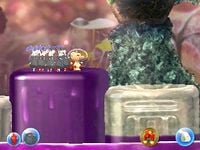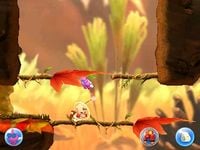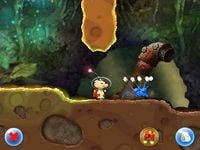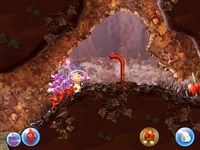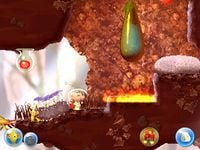Minor tools
|
To do: Find out each tool's internal name if not done so already, and if they differ from the names on the wiki, change the names in this article. |
There are many tools in the Pikmin series. This page lists the ones that are rarer and less notable. Because they are rarely acknowledged by the games, their names are usually conjectural.
Hey! Pikmin
Floating bottle
Floating bottles are the main objects of Septic Swamp. They are found in the poison lakes of the area, where they bob up and down and act as platforms the player can move across on. At certain intervals, some will sink into the poison lake, and then come back up again. How far down each goes depends on the bottle, and some even get completely submerged. The player can tell the lowest point it can get by looking at what part of it has poison water dripping off.
Locations
- Lushlife Murk
- Septic Swamp: This is the only area they can be found in, where they act as the "gimmick" of the level. The abundance of moving floating bottles consists of nearly all the terrain, creating more difficulty. The player can easily get separated from their Pikmin if a bottle starts sinking, and their Pikmin can easily get lost and even die.
Leaf platform
Leaf platforms are the main tool of Leafswirl Lagoon. At first they hang down, but when wind blows they become parallel to the ground, and act like a platform that Olimar can walk on.
Locations
- Leafswirl Lagoon
- Gale-Force Glen: These tools are found in this area only, and are mandatory if the player wants to make progress in the area.
Metal pipe
The metal pipe is a rusty pipe with a curve at the end found in one area in the game. It serves as a ramp that allows the player to reach higher places. It originally is trapped deep in the ground, and Pikmin are required to dig it out, in a way similar to climbing sticks. Once it is completely dug, the player and their Pikmin can then walk up it. If the player or a Pikmin is under it after the Pikmin complete it, then they can walk past it. After they walk past, doing so in the other direction will automatically make them walk up the pipe.
Locations
- Snowfall Field
- Below the Ice: The only one in the game appears here, and is found in the bottom of a pool of water near the beginning. At first it can't be dug out, so the player must drain the water by breaking a clog. The player's Pikmin can then dig the pipe out, and it will lead to the ground above.
Rusted rod
The rusted rod is a tool found only once in one area of the game. This object can be dug up by Pikmin (like the metal pipe), and it can be climbed up by Olimar and his Pikmin, just like vines.
Locations
- Sweltering Parchlands
- Sizzling Precipice: This is the only area where this tool can be found. It must be dug by the Pikmin in order to progress in the area.
Water sac
The water sac is a rare tool found a few times in Barriers of Flame. It is a see-through green sack full of water. When destroyed with Pikmin, the water will drop out and extinguish any fire beneath it.
Locations
- Sweltering Parchlands
- Barriers of Flame: This is their only location, where they serve as one of the ways to take out the fires, considering Red Pikmin are absent.
Names in other languages
Leaf platform
| Language | Name | Meaning | Notes |
|---|---|---|---|
| パタパタ草? Patapata Kusa |
Pitter patter grass | Grass in this case refers to a plant that grows out of the ground without woody elements, though this does not match the English name well |
Water sac
| Language | Name | Meaning | Notes |
|---|---|---|---|
| スケナスビ? Sukenasubi |
Transparent eggplant-shaped sack | スケ is likely from the verb 透ける meaning to be transparent, while ナスビ is the word for eggplant/aubergine. This is probably used to highlight the shape of the object |
See also
| hideTools |
|---|
|
|
| Minor tools |
